Guest Posting Guidelines: 9 Tips To Accepting Blogs
-

Aaron Gray
- Blogs
-
 January 10 , 2018
January 10 , 2018 -
 8 min read
8 min read
Accepting guest posts on your site can be one of the best things you do this year as long as they meet your guest posting guidelines. There’s a lot of pros to accepting guest posts:
- Gain fresh content to fill your blog.
- Open your audience to new information by experts in your niche.
- Create an authority blog which people turn to for help.
Allowing guest posts is a great idea. However, you still have to be careful when it comes to Google’s prying eyes.

Accepting the wrong type of guest posts can dramatically affect your website’s rankings. But, how do you know what is right and what is wrong? In this article we’ll go into detail of the top X rules to follow when accepting posts.
Guest Posting Guidelines 101: Set The Rules
1. Set Your Content Standards Early Guest bloggers can write great content, but they can write bad content as well. Just because you receive an article, it doesn’t mean you have to publish it. To maintain integrity on your website, you need to set content standards at an early stage. Decide on what matters most to you and what is rejection worthy. To give you context, here are some things I’d reject if they were sent to me:
- Poorly Written Content – This is a dead giveaway. Spelling mistakes littering the piece, poor sentence structure and glaring grammatical errors.
- Off Topic Content – Content which doesn’t answer the topic that was pitched to you to begin with.
- Plagiarised Content – Content that was copied from other sources. This includes spun content and/or content which doesn’t pass Copyscape.com.
- Spammy Content – Content that has a target keyword consistently added to the article in an unnatural way.
- Underwhelmed Content – Articles which don’t add value and just don’t offer that wow factor you’re after with helpful tips and information.
As a website owner you need to know the worth of your website. Don’t accept everything just for the sake of it. Make sure the guest post has a purpose and is a good read for your audience to maintain your authority. Some things to look for with content quality include:
- Details and descriptive content.
- Content which answers the readers’ questions thoroughly and provides examples where needed.
- Topics which are unique, interesting and left field which may be new takes on older subjects.
- Content which is just plain impressive.
You’ll know good content when you see it because it’ll stand out from the bad content you’ll receive.

2. Don’t Be Tempted By The Price Some publishers tend to post a lot on their website because people are willing to pay them. While this is a good way to make a steady stream of income, it’s important to be mindful as well. You’ve got to remember:
- The more you add poorly written content to your website, the worse your rankings will get.
- The lower your rankings drop, the less likely people will want to guest post on your site.
This, in turn, can cause you to actually lose more money than if you were to reject a few guest posts here and there. So, don’t let price dictate whether you upload content or not; base your decision more on quality over anything else.

3. Avoid Author Accounts Many websites allow external writers to have contributor accounts, however the downside to this is you may find it hard to control what content is uploaded onto your website. Contributor accounts open your site up to:
- Poorly written content.
- Spammy link building practices.
- Website hacking.
- Plagiarised content.
- Deleted content.
- Unapproved added links, with someone else pocketing the money.
If you find uploading content a tedious task, you may be able to tweak the settings of contributor accounts and allow writers to only upload drafts ready for publishing. You can then review and decide if you want to publish or not. This is a great time-saving option.

4. Decide What To Promote Businesses use guest posting to promote their products or services. The key thing to decide is the type of products, services or content you want to promote on your website. Before deciding to approve or reject a guest post, it’s important to consider:
- Is it in the same niche as you?
- Would your target audience be interested in the product or service?
- Do you feel ethically okay promoting the company?
- Is the product or service of interest to you?
- Can you get a sample of the product to review?
- What type of promotion do they want? (Review, backlink, mention, etc.)
Promoting businesses isn’t for everyone, however it can be a beneficial experience when mutually agreed upon.
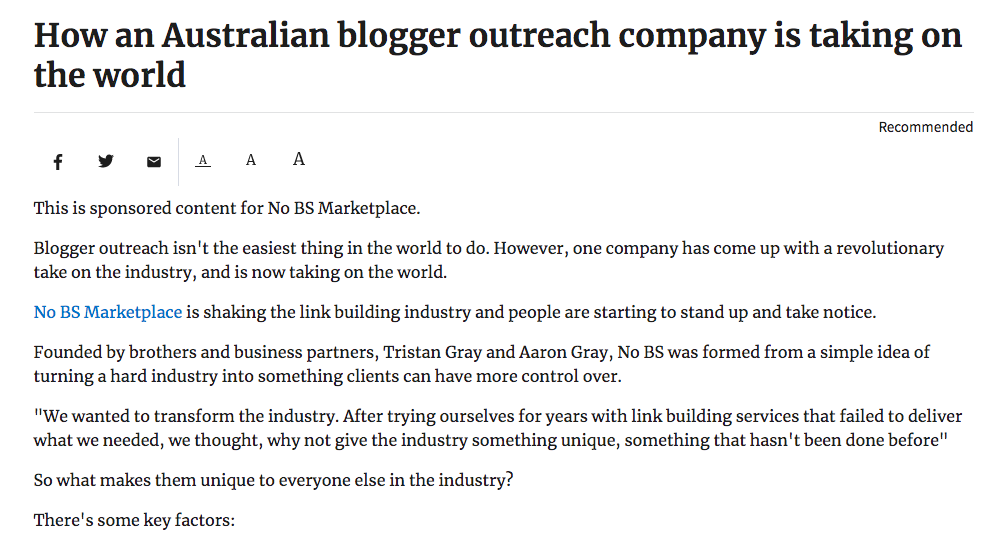
5. Acceptable Images Imagery makes any piece of content stand out. The problem is, some inexperienced guest bloggers may try to use images from other websites which may not be approved for use. Failing to obtain permission for images can damage your website’s reputation and can also lead to legal action, depending on the images used. Instead, it’s a good idea to purchase stock images which are licensed for use. Some great websites that offer stock images include:
- Adobe Stock Images
- Shutterstock
- Deposit Photos
- Unsplash
- iStock Photo
- Pexels
- Pixabay
- Stock Photo Secrets
When searching stock images, make sure the images selected are of good quality and match the content. Poor quality images should be avoided where possible.

6. Niches You Wish To Accept or Reject Accepting content should be based on the niche of the content itself and the niche of your website. Before accepting guest posts, you’ll need to define your main niche and any subniches you might like to accept on your website. Here’s an example:
- Blog Type: SEO blog
- Main Niche: Digital Marketing
- Subniche: Business
Subniches allow you to open your site to more content but keep it within a similar network of niches. This enables you to mix your main blog theme with sub-themes to create more enticing and relatable topics for your readership. It’s also important to define what niches you don’t accept. This is an example of the niches a site doesn’t take:
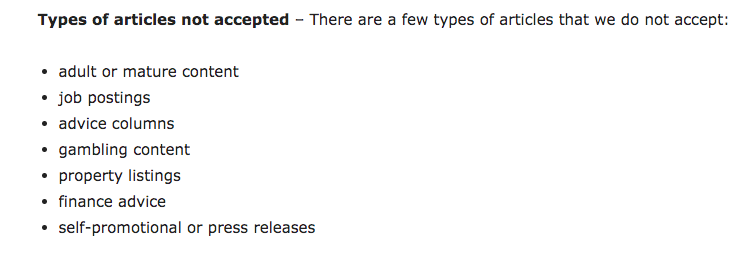
7. Content Length Deciding on your content length prior to accepting blogs is also important. You don’t want to post lengthy fluff pieces which take up around 5,000 words and fail to add value, nor do you want 200-word articles which lack substance. Most websites generally take a minimum of 500 words and a maximum of 3,000 words. The reason for this is it’s just enough for readers to stay on the page and digest what’s written, while remaining engaged. It’s also a good length for substantial information to be included. How long your content is, is really up to you and what you feel is right for your blog.
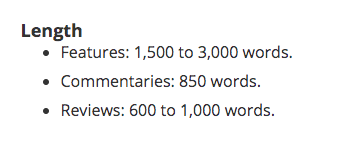
Blog’s voice is the key to resonating with your audience. The tone and voice should be decided on prior to accepting posts to help maintain consistency throughout the site. Depending on your blog, you can have tones which are:
- Casual/relaxed
- Professional
- Academic
- Fun and uplifting
- Neutral
These are some of the common types of tones which many blogs use. If you have trouble working out the voice of your blog, it’s best to start by considering the niche you’re in and who you’re trying to target. Business-type blogs may be better with a professional tone, while a parenting blog may be fun and uplifting.
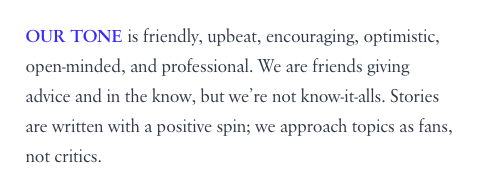
8. Be Clear About Payment Details Receiving payments for guest posts can be a great benefit. However, depending on the blogger you’re working with, you might come across a few which drag out sending payment for completed work. Because of this, it’s important to set clear payment guidelines. Some things to consider are:
- Stating clear dates of payment – e.g. 3 days from publishing the content.
- Details of how much you charge per post. If the cost isn’t negotiable, this needs to be clear to the blogger.
- Clear instructions as to what will happen if payment isn’t sent – e.g. Post will be pulled down after 3 days.
- If required, setup a pre-payment program – e.g. Once you receive payment, the content will be published.
- State which payment methods you take – PayPal, TransferWise, etc.
Delivering clear instructions in regards to payment is essential when accepting guest posts. The blogger should be aware of the terms prior to writing the content to ensure they wish to continue.
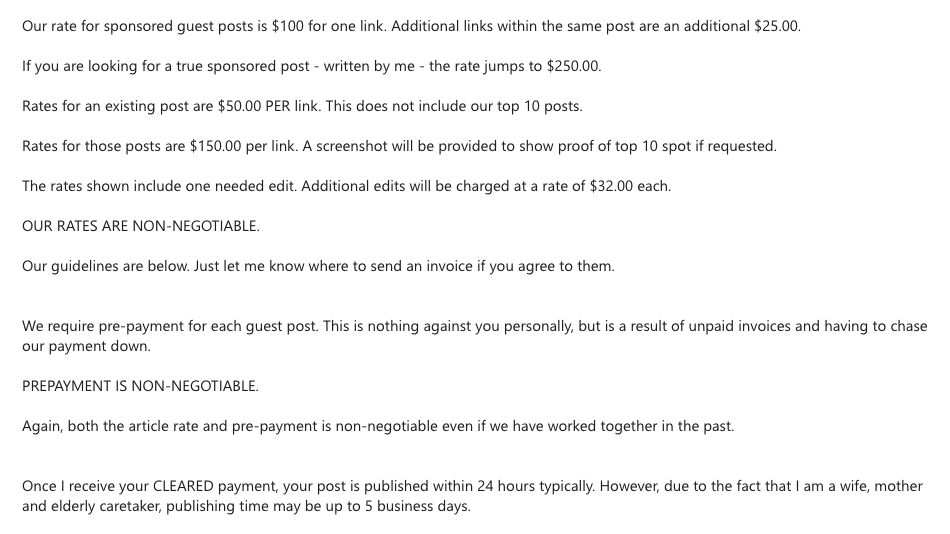
Takeaway
Accepting guest posts on your website isn’t to be taken lightly. Always set your guidelines early in order to maintain the voice and integrity of your blog. Blogs which have a formal structure to their guidelines generally have a better chance of becoming an authority in their niche. Are you prepared to accept guest posts?
Subscribe to Our Blog
Stay up to date with the latest marketing, sales, service tips and news.
Sign Up
"*" indicates required fields


